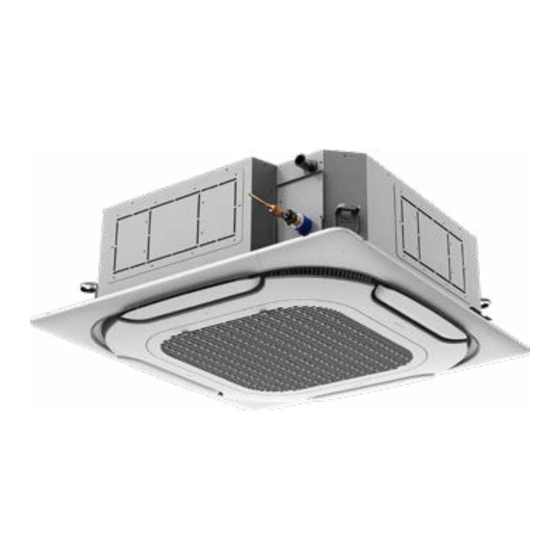ActronAir ECOFLEX MINI VRF R-32 Series Panduan Pemilik - Halaman 9
Jelajahi secara online atau unduh pdf Panduan Pemilik untuk Pendingin Udara ActronAir ECOFLEX MINI VRF R-32 Series. ActronAir ECOFLEX MINI VRF R-32 Series 20 halaman. Four-way compact cassette
Juga untuk ActronAir ECOFLEX MINI VRF R-32 Series: Panduan Pemilik (20 halaman), Panduan Pemilik (20 halaman), Panduan Pemilik (20 halaman), Panduan Pemilik (20 halaman), Panduan Pemilik (20 halaman)

Owner's Manual
5. If a vacuum is not possible, make a manifold so that refrigerant can be removed from various parts of the system.
6. Make sure that cylinder is situated on the scales before recovery takes place.
7. Start the recovery machine and operate in accordance with manufacturer's instructions.
8. Do not overfill cylinders. (No more than 80 % volume liquid charge).
9. Do not exceed the maximum working pressure of the cylinder, even temporarily.
10. When the cylinders have been filled correctly and the process completed, make sure that the cylinders and the
equipment are removed from site promptly and all isolation valves on the equipment are closed off.
11. Recovered refrigerant shall not be charged into another refrigeration system unless it has been cleaned and
checked.
• This process shall be repeated until no refrigerant is within the system. When the final OFN charge is used, the system
shall be vented down to atmospheric pressure to enable work to take place.
• This operation is absolutely vital if brazing operations on the pipe-work are to take place.
• Ensure that the outlet for the vacuum pump is not close to any ignition sources and there is ventilation available.
• Ensure that contamination of different refrigerants does not occur when using charging equipment. Hoses or lines
shall be as short as possible to minimise the amount of refrigerant contained in them.
• Prior to recharging the system it shall be pressure tested with OFN. DD.12 Decommissioning:
• Before carrying out this procedure, it is essential that the technician is completely familiar with the equipment and
all its detail. It is recommended good practice that all refrigerants are recovered safely. Prior to the task being carried
out, an oil and refrigerant sample shall be taken in case analysis is required prior to re-use of reclaimed refrigerant. It is
essential that electrical power is available before the task is commenced.
• Equipment shall be labelled stating that it has been de-commissioned and emptied of refrigerant. The label shall
be dated and signed. Ensure that there are labels on the equipment stating the equipment contains flammable
refrigerant.
• When removing refrigerant from a system, either for servicing or decommissioning, it is recommended good practice
that all refrigerants are removed safely.
• When transferring refrigerant into cylinders, ensure that only appropriate refrigerant recovery cylinders are employed.
Ensure that the correct number of cylinders for holding the total system charge are available. All cylinders to be used
are designated for the recovered refrigerant and labelled for that refrigerant (i.e. special cylinders for the recovery
of refrigerant). Cylinders shall be complete with pressure relief valve and associated shut-off valves in good working
order. Empty recovery cylinders are evacuated and, if possible, cooled before recovery occurs.
• The recovery equipment shall be in good working order with a set of instructions concerning the equipment that is
at hand and shall be suitable for the recovery of flammable refrigerants. In addition, a set of calibrated weighing scales
shall be available and in good working order. Hoses shall be complete with leak-free disconnect couplings and in
good condition. Before using the recovery machine, check that it is in satisfactory working order, has been properly
maintained and that any associated electrical components are sealed to prevent ignition in the event of a refrigerant
release. Consult manufacturer if in doubt.
• The recovered refrigerant shall be returned to the refrigerant supplier in the correct recovery cylinder, and the
relevant Waste Transfer Note arranged. Do not mix refrigerants in recovery units and especially not in cylinders.
• If compressors or compressor oils are to be removed, ensure that they have been evacuated to an acceptable level
to make certain that flammable refrigerant does not remain within the lubricant. The evacuation process shall be
carried out prior to returning the compressor to the suppliers. Only electric heating to the compressor body shall be
employed to accelerate this process. When oil is drained from a system, it shall be carried out safely.
• Warning: disconnect the appliance from its power source during service and when replacing parts.
• These units are partial unit air conditioners, complying with partial unit requirements of this International Standard,
and must only be connected to other units that have been confirmed as complying to corresponding partial unit
requirements of this International Standard.
Owner's Manual ECOFLEX MINI VRF R-32 SERIES - HIGH WALLS
Doc. No.9590-4028-07 Ver. 1 230821
ECOFLEX MINI VRF R-32 SERIES
9
